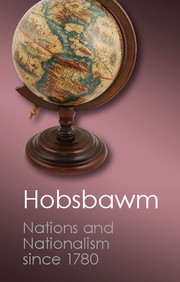Book contents
1 - The nation a s novelty: from revolution to liberalism
Published online by Cambridge University Press: 05 July 2014
Summary
The basic characteristic of the modern nation and everything connected with it is its modernity. This is now well understood, but the opposite assumption, that national identification is somehow so natural, primary and permanent as to precede history, is so widely held that it may be useful to illustrate the modernity of the vocabulary of the subject itself. The Dictionary of the Royal Spanish Academy, whose various editions have been scrutinized for this purpose does not use the terminology of state, nation and language in the modern manner before its edition of 1884. Here, for the first time, we learn that the lengua nacional is ‘the official and literary language of a country, and the one generally spoken in that country, as distinct from dialects and the languages of other nations’. The entry under ‘dialect’ establishes the same relation between it and the national language. Before 1884 the word nación simply meant ‘the aggregate of the inhabitants of a province, a country or a kingdom’ and also ‘a foreigner’. But now it was given as ‘a State or political body which recognizes a supreme centre of common government’ and also ‘the territory constituted by that state and its individual inhabitants, considered as a whole’, and henceforth the element of a common and supreme state is central to such definitions, at least in the Iberian world. The nación is the ‘conjunto de los habitantes de un país regido por un mismo gobierno’ (emphasis added).
- Type
- Chapter
- Information
- Nations and Nationalism since 1780Programme, Myth, Reality, pp. 14 - 45Publisher: Cambridge University PressPrint publication year: 2012



